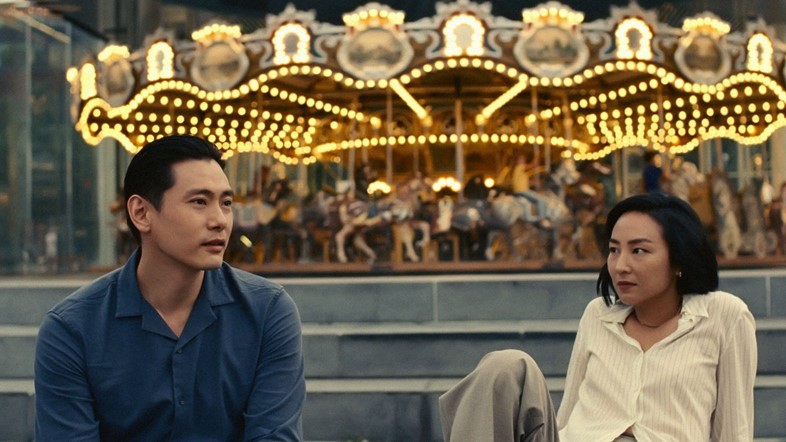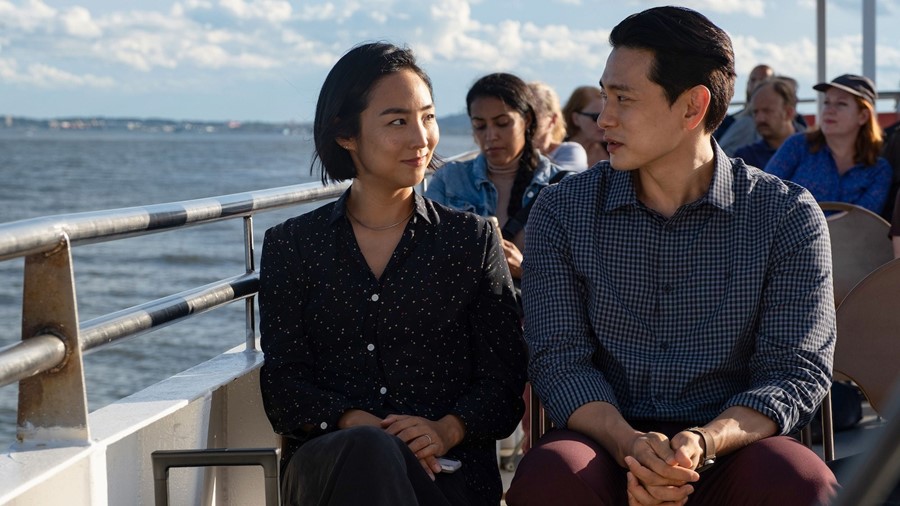As her emotional A24 drama hits UK cinemas, Celine Song talks about the impetus behind Past Lives and why human relationships are her “primary drug”
Audiences all seem to agree: Celine Song’s Past Lives is a film that will emotionally knock you off your feet. And this can come without warning, because it’s not a melodrama of sweeping sentiment or a blockbuster of swaggering big-bang effects. The wry, cannily observant arthouse comedy-drama, set between New York and Seoul, is alert to the everyday way people seem to just fall in together or part ways, regardless of any grand plan. The subtle, aching beauty with which it captures human affinities and inevitable losses that span decades and different continents, in its story of a bond paused and twice rekindled, is developed with such pitch-perfect assurance it’s hard to believe it’s a feature debut. Song shed light on how she managed to pull this off in an hour-long talk at the Karlovy Vary International Film Festival in the Czech Republic in July, where the film screened after its Sundance premiere earlier in the year.
The key, for Song, was writing a story she already knew inside-out from her own experiences. If she believed in it enough, others couldn’t help but do the same. She credits a playwriting professor for once telling her: “If you make something you connect with personally and deeply and that feels true to you, since you’re not an alien but a person, it will connect with others too on this Earth.” Trained in theatre, she had been penning plays for around a decade before she wrote the script for Past Lives. The stage served as a “boot camp,” she said, in how to make a story work. “You have less to help you in theatre; it’s just a room with actors and your words.”
In Past Lives, Greta Lee (known for her role as Nadia’s friend Maxine in hit Netflix show Russian Doll) plays the headstrong, fast-quipping Na Young, later known as Nora. Like Song herself, Nora was born in South Korea, and immigrated as a kid to North America, where she lives as a playwright in New York. Nora’s creative ambitions led her to cross paths with fellow writer Arthur (John Magaro) on a residency and they are now married.
There is little tying Nora to the child she was in Seoul – until Hae Sung (Teo Yoo), her childhood sweetheart, pays a visit to the States. They’d reconnected in an intense friendship in their youthful days of early millennium bad Skype connections, charted as an extended flashback in the film’s mid-section, that had fizzled out from the pressure of long distance. He’s intent to resolve that lack of closure. “It’s like they are seeing a ghost, a person who’s been resurrected from the dead,” said Song of the friends, who feel, after 24 years apart, deeply familiar, and yet, with their hugely divergent lifestyles, like total strangers.
Arthur speaks only rudimentary Korean (he’s started lessons, to understand what she says when she talks in her sleep.) Not having Hae Sung’s level of access to the roots of her identity, he feels insecure and threatened. But cliched narrative expectations are thwarted in a brilliantly inspired and constructed twist. The space is created, instead, for us to reflect on how to be ourselves with other people across time, as complex, existential questions about the nature of love, fate, paths not taken, authenticity and self-realisation bubble up.

“Even in the most intimate relationship where you share a language and culture, there is always going to be a part of the person that you are never going to know, because that person has another subjective experience. And the better you know them, the better you know that,” said Song. “The movie is not about knowing someone else; it’s about trying.”
The film is, according to Song, also about “how love actually feels in our everyday lives.” This is love that is not couched in big gestures, or the goal-oriented logic driving mainstream romance. “Dating is a capitalism or acquisition thing: to get a boyfriend, get married or get that person, or feel you’re more attractive on the marketplace and can do better. That has nothing to do with love; it’s capitalism.”
Song positions us right from the start as private investigators, trying to work out who her characters are to one another – though the mystery of connection is something she readily admits she may never fully grasp herself. “I have trouble being interested in things that are not a mystery to me,” she said. “I need to feel like the thing I’m making is smarter than me.”
It’s a mystery she never tires of. “Human relationships are my primary drug, so no matter what I’m doing, that’s what I’m connected to. That’s the thing that I crave all the time – what are people like, and what are they really like when they think nobody’s looking.”
Past Lives is out in UK cinemas now.
